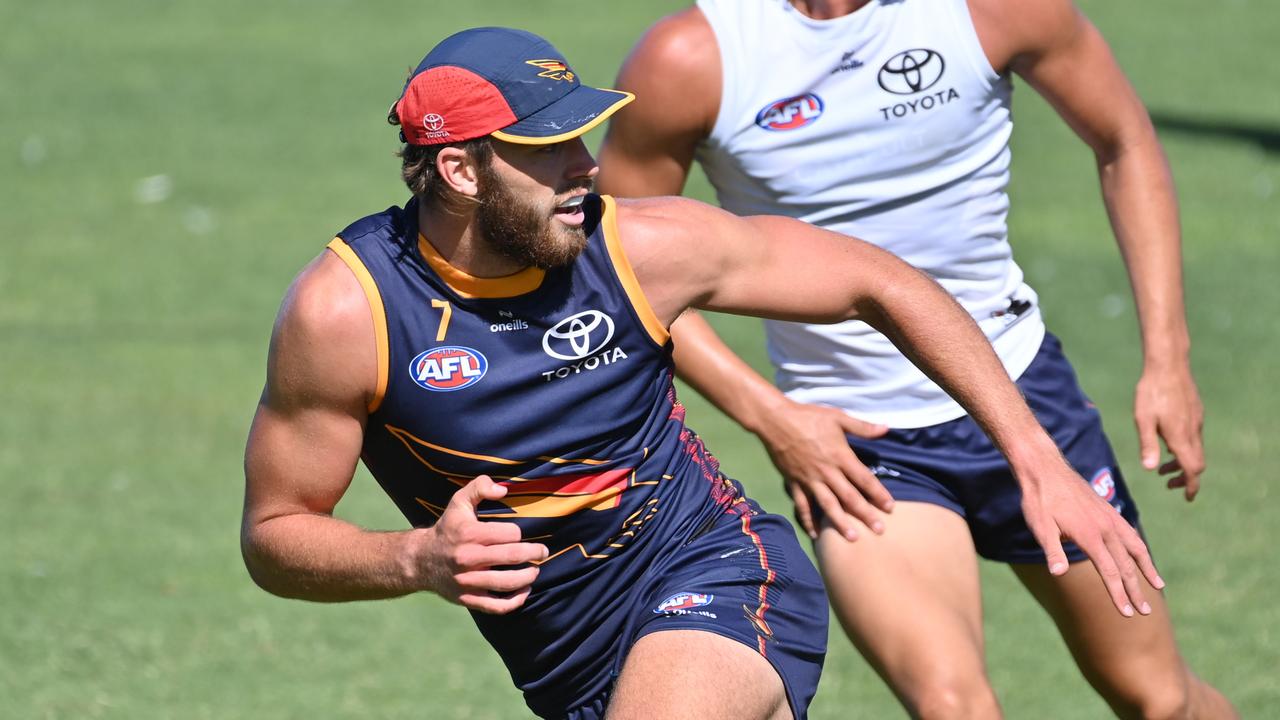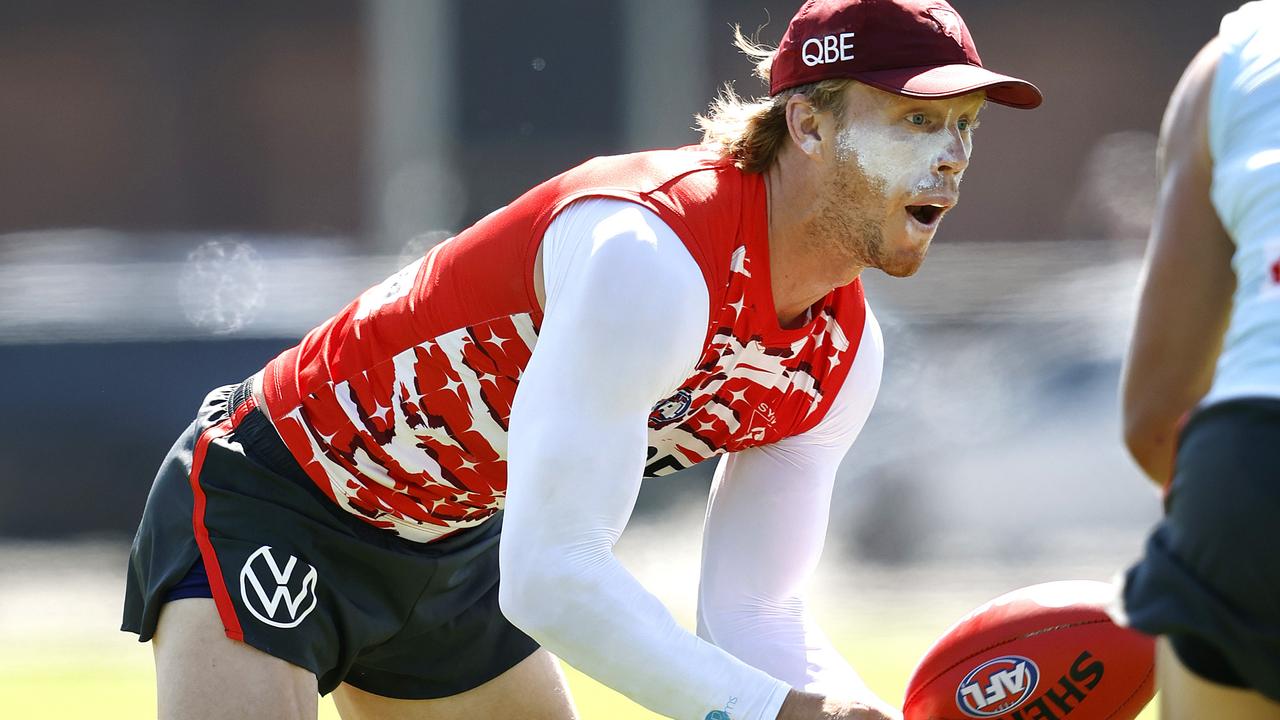The Blight Files — Part 4: How ‘Blighty almighty’ conjured football miracle with the Adelaide Crows
MALCOLM Blight’s Geelong teams had stumbled at the very gates of football paradise. Then, in a match made in heaven, he took the throne at Adelaide Football Club. And did what “messiahs” do.
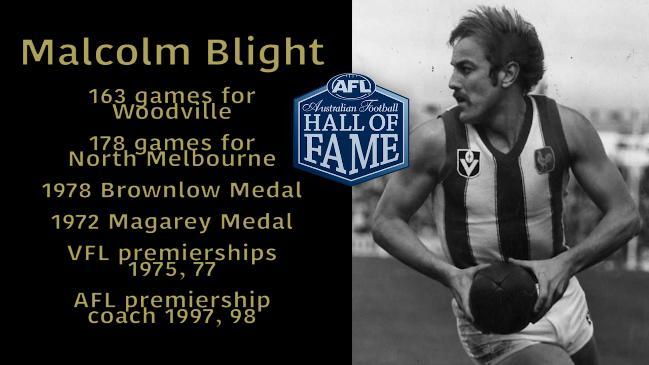
AFL News
Don't miss out on the headlines from AFL News. Followed categories will be added to My News.
- The Blight Files: Part 1 — start of greatness
- The Blight Files: Part 2 — getting Cats up to scratch
- The Blight Files: Part 3 — ’Messiah’ back in promised land
- Odd Couple: All hail the legend
MALCOLM Blight’s immediate success — with breakthrough back-to-back flags in 1997-98 — was indeed, in a football context, a miracle.
“And not to plan,” says John Reid, Blight’s right-hand man and the Crows football chief from 1995-2009. “The best laid plans of mice and men do come unstuck ... and this one did so magnificently.”
Reid’s mid-season review at the Adelaide Football Club in June 1996 put Blight’s name on the top of the list of contenders to replace Robert Shaw as Crows coach.
When Blight, who was working with Channel Seven in Melbourne, agreed to terms — without the much-speculated $1 million salary — he imagined a three-year run at preparing the Crows for a flag, just as Michael Malthouse had needed at West Coast.
Blight and Reid met for three days at Blight’s holiday retreat on Victoria’s Mornington Peninsula to “devise a plan — a three-year plan”.
“We laugh about it now,” Reid said.
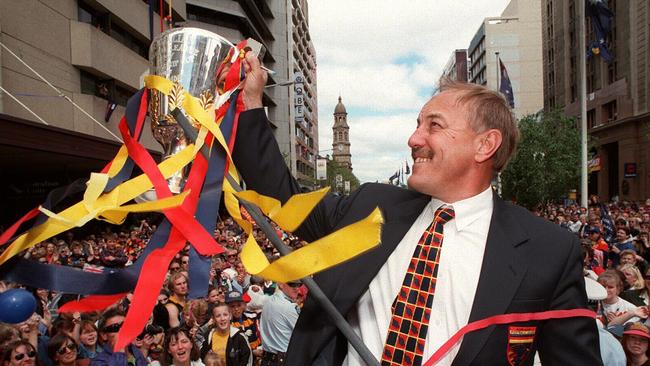
The key to this plan — which fulfilled Blight as a coach after his three grand final defeats with Geelong and sacking at North Melbourne and gave the Crows the success and status they craved — was Blight’s clear and simple approach.
“Malcolm knew how he wanted to play it,” Reid said. “We knew our strengths, our weaknesses and where we needed to go ... but a flag in 12 months? No. And we weren’t the best team in the competition in 1997 (when the Crows ranked fourth with a 13-9 win-loss record). But we did play our best football when it counted.”
Blight was probably owed those two flags at Adelaide by his so-called “footy gods”.
“They were bonus wins,” said Blight.
“We had nothing to lose. We looked to be completely irrelevant. We had injuries. Nothing seemed to be going right.
“We became the first team to win four finals in 1997, each one was a real struggle. It wasn’t until the final siren in that grand final (with St Kilda) that you got to enjoy it.
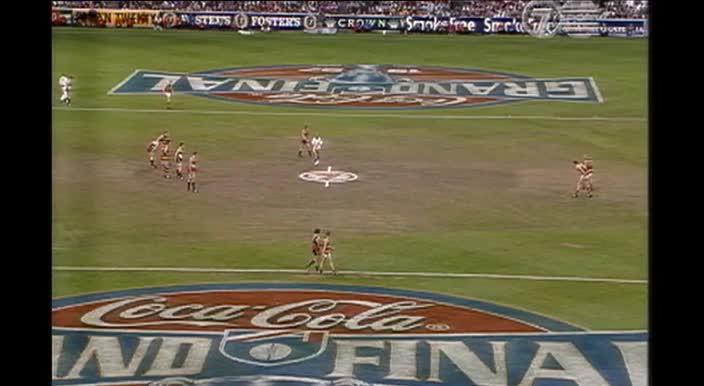
“Same in 1998 (against North Melbourne) when we became the first team to win the flag from fifth.”
Blight’s first month — with a 1-3 win-loss record including failure in the first Showdown with Port Adelaide at Football Park in April 1997 — was true to the expectations he and Reid had when they set about putting together the three-year plan at Blairgowrie on the Mornington Peninsula.
But it was did not reflect what Blight and Reid had noted of the Crows players from the first team meeting at Football Park late in the spring of 1996.
“There was a good synergy between players and coach from the start,” Reid said.
“Malcolm set out his plan. His picture was clear. It was easy to understand. He presented it in a very direct way. You knew what he expected — and there was no give or take.
“His message was, ‘This is how we will play — and this is why we are going to play this way’.
“I remember watching the lads walking out of that meeting feeling sure that they fully understood what he wanted.”
Blight’s first season at West Lakes was filled with — true his eccentric image — the bizarre, the astute and the brilliant.
On April 5, after the Crows had fallen to 1-1 with a 28-point loss to Richmond at the MCG, he put every player on notice as he tagged ruckman David Pittman with the “pathetic” tag.
Two weeks later he stopped the Crows players losing self-belief after defeat to the upstart Power in the Showdown by putting one simple, clear message on the team whiteboard: “18”.
This reflected the number of games still to be played on Adelaide’s fixture.
“It wasn’t going to be hard to pull this group together,” said Reid, “when they were hanging off every word Malcolm was saying. We weren’t winning games, but we were heading in the right direction.”
And on September 27, in Adelaide’s first grand final, there were the master strokes. Although on the eve of his fourth grand final, Blight admits he could not sleep.
“Petrified,” Blight says of his emotions. “Had we lost, I was a four-time loser ...”
On no sleep, Blight did coach brilliantly in the grand final.
He had Shane Ellen, who had kicked just three goals in his career and none in 1997, starting in attack to cover the loss of Coleman Medallist forward Tony Modra (knee). Ellen kicked five against St Kilda.
Crows chief executive Bill Sanders had seen this masterstroke before at Woodville in the 1980s when Blight called up to the league side a centre half-forward who, as Sanders recalled it, “could not get a kick in the reserves.”
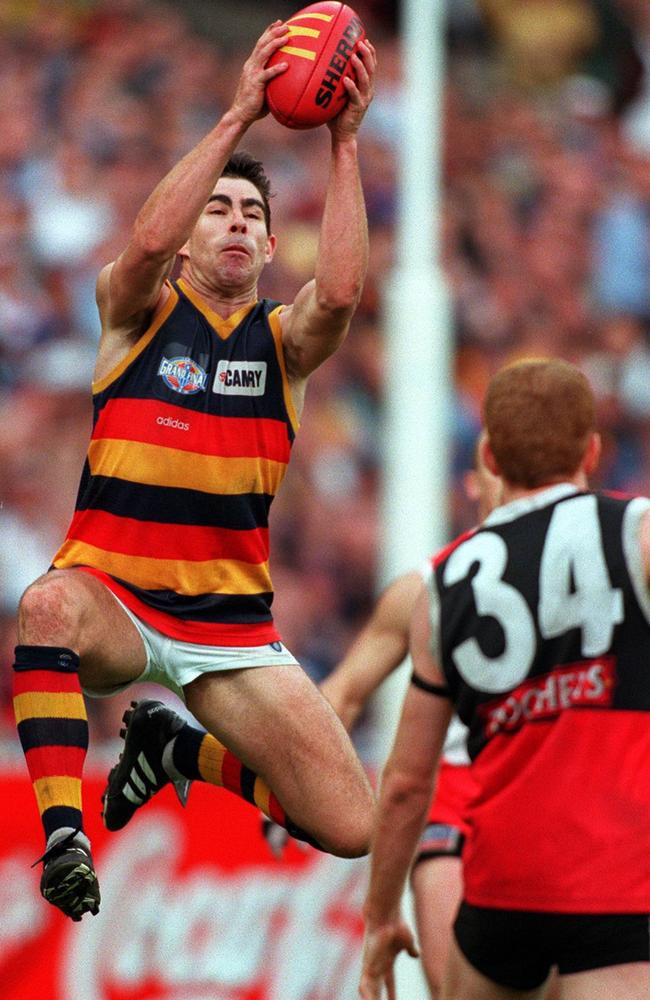
“But he did in the league side,” Sanders said.
“That’s Malcolm. He could read people better than anyone I’ve seen. He had this intuitive way of knowing when a player was going to perform.”
There also was Blight’s key move of Darren Jarman, having him start from the back of the centre square in the last quarter of the grand final — and running to the goalsquare to kick a record five goals against flat-footed St Kilda defender Jamie Shanhan in the last term.
“You didn’t do that stuff then, but Malcolm wasn’t going to not try different things,” recalled Reid. “People always raise the eccentric incidents about Malcolm.
“But it should be remembered he was a really good coach — and the players loved him, they loved playing for him, they learned from him.
“He was hard, but he also was fair. He could have a fair decent crack — and half an hour later you could then find him sitting with the player he had sprayed having a beer with him.”
Blight’s eccentric nature had Sanders carrying one concern as the celebrations began with the AFL premiership trophy on a lap of honour of the MCG.
“I remembered,” said Sanders, “how Malcolm had told me, ‘I could walk away from this job at any time’. I was thinking, this is the moment when he could say to me, ‘Done it! Seeya later’.”
There was still an encore to come, and 12 months later, Blight and captain Mark Bickley lifted the AFL cup aloft for a second time.
Sure, that second flag proved that the first could not be written off as a fluke.
But it also cemented in SA football immortality the boy who had once used a bag of socks as a footy in the backyard of his suburban Woodville home.
Blighty at both ends of the axe
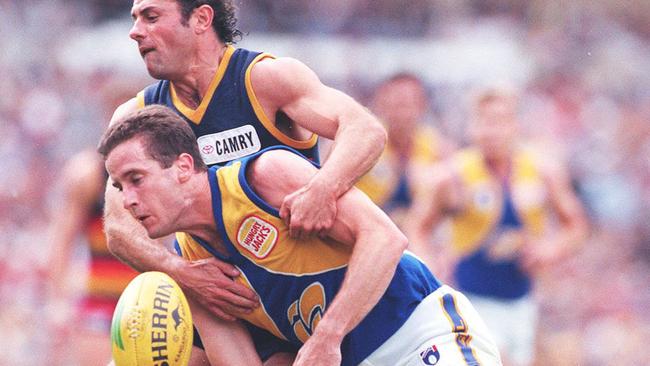
WHAT goes around, comes around ...
Malcolm Blight’s arrival at the Adelaide Football Club late in the spring of 1996 was preceded by the bloodbath axing of five Crows stalwarts.
Inaugural captain Chris McDermott. Magarey Medallist Andrew Jarman, who had signed his own death warrant earlier in the year when — after being dropped from the AFL line-up — he refused to answer a late recall to cover an ill teammate. Greg Anderson. Wayne Weidemann.
And captain Tony McGuinness, although Blight had hoped the Magarey Medallist would take the hint to gracefully retire rather than become caught in the cull at West Lakes.
Blight did not meet with McDermott, Jarman, Anderson and Weidemann, leaving Reid to tell them of their sacking.
“It fell on me,” Reid said, “because Malcolm was still tied up with Channel Seven (during the 1996 AFL final series) and we needed things to move with setting up the team for 1997. He said to me, ‘You’re the man’.”
McGuinness, as captain, asked to meet Blight to make his case to stay on the player list.
“And at the end of that talk they agreed to disagree,” said Reid.
“We won the flag in 1997 so no-one was going to argue with the decisions we made.”
McDermott, who played just nine of a possible 22 AFL games in 1996, knew what to expect as he — and the other four arrived at West Lakes — meeting at the “Crows Tavern” on the western side of Football Park.
“Jars was up at 4, I was to go Reidy’s office at 4.15, Tony (McGuiness) at 4.30 ...,” recalled McDermott. “One by one we went.
“
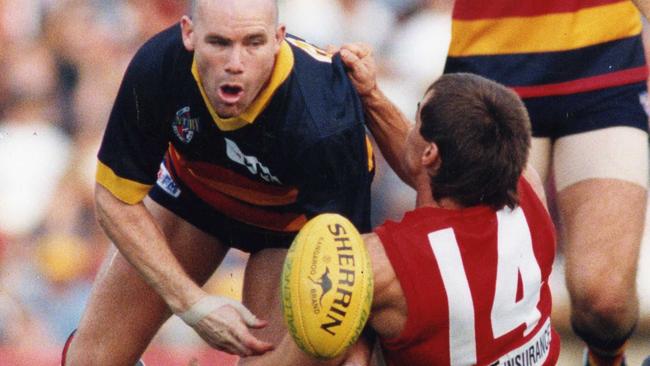
Jars came back to the Tavern where we had bumped into Russell Ebert and were having a beer. He was done.
“I went — and I came back very quickly. It had been a difficult year for all of us. Most of us were emotionally gone by the time we were called to Reidy’s office.
“Then Tony went in to see Reidy. He came back with the same message. No room for him either.
“We were all done. We asked to meet Malcolm. He didn’t want to meet with us.
“On the Thursday night, Jars and I were on the (Channel Nine) Footy Show ... sitting in a dumpster.”
A year later, McDermott — coaching North Adelaide in the SANFL — watched the Crows claim their first AFL flag with his emotions still numb rather than reinvigorated by his former teammates success.
“There wasn’t any joy ... and that’s not said to be disrespectful,” McDermott said.
“I had joy for my mates — Mark Ricciuto, Shaun Rehn, Mark Bickley. But it was not there for the collective. What had happened a year earlier was still too raw.”
Four years later, it was Blight’s turn. His ill-fated return to coaching at St Kilda put Blight on the end of an axe.
The Saints board sacked him after a 15-game run — fulfilling a warning some of Blight’s close advisers had predicted after their own meetings with the St Kilda leadership.
“Across my 50 seasons, every box was ticked … including my removal from jobs (at St Kilda and as playing coach at North Melbourne after 16 games in 1981),” Blight said.
“I made decisions on people — that was my role (as coach). People made decisions on me too.
“You stay as long as I did, you learn everyone is in the same boat. There will come a time when someone will say, ‘Malcolm, your time is up.’
“And just as some of those decisions hurt me the deepest, I know the decisions I made on some did the same to them. I’ve been through every emotion … every situation, every outcome.”
Port Adelaide senior coach Ken Hinkley was part of Blight’s staff as an assistant coach at St Kilda. He quit immediately after Blight’s sacking.
“Malcolm did as Malcolm does (at St Kilda),” Hinkley said. “And sometimes what Malcolm does won’t match up with the thoughts and plans of others.
“Malcolm was delivering on his part of the bargain (at St Kilda where he had a 3-12 win-loss record after winning just two of 22 games the previous season).
“Malcolm had his way to get the best response from the players. And history will record it ended with his sacking. But there was no other way Malcolm was going to do that job.”
michelangelo.rucci@news.com.au

